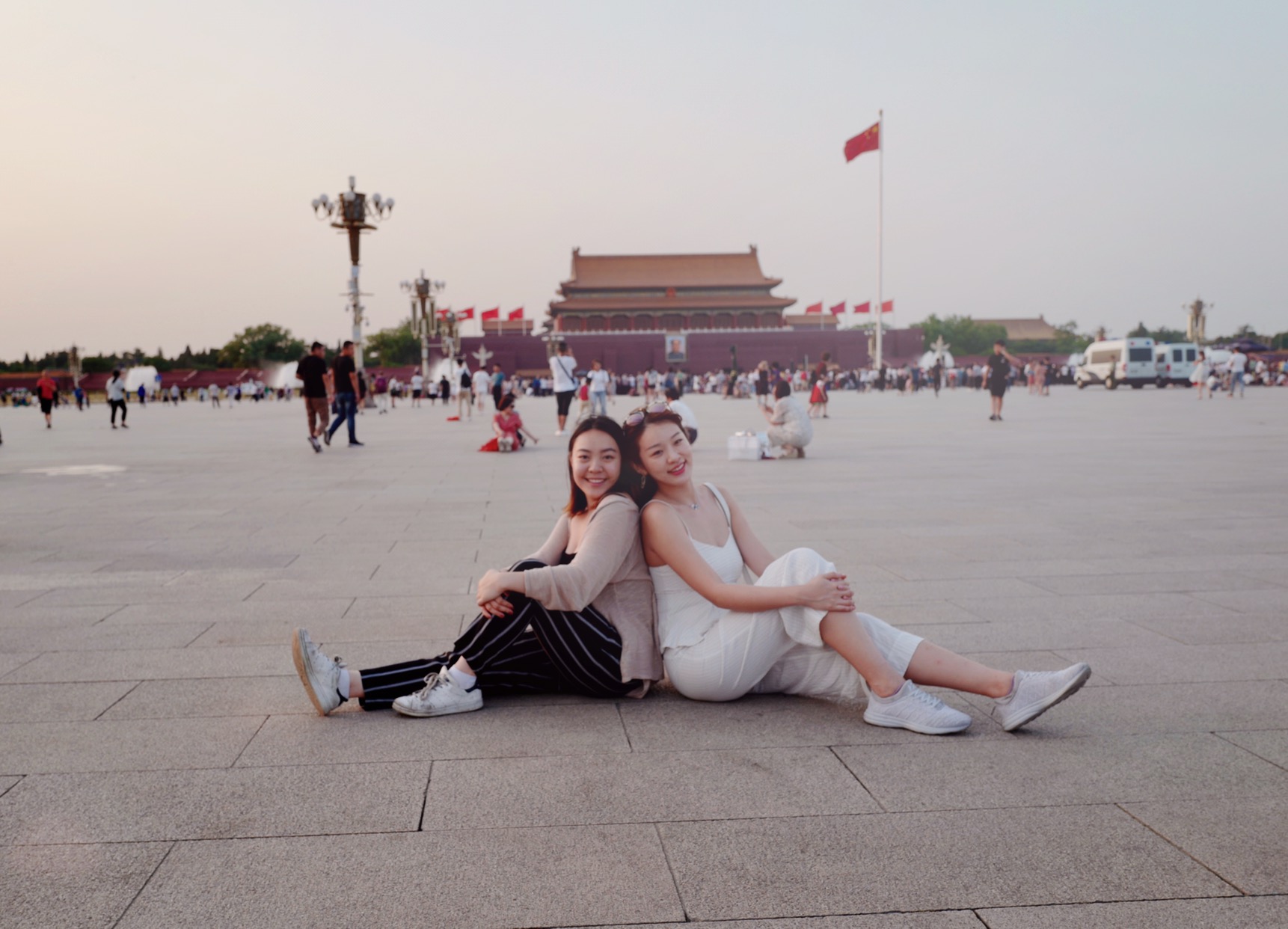A Chinese-American Take on China
By: Beverly Deng, Wharton ’21

Beverly (left) on a visit to Tiananmen Square
Diversified Agency Services (DAS) – Shanghai, China
I was born in Glendale, California in 1999 to a Chinese father and Taiwanese mother. Considering the overwhelming majority of my school district was Asian-American like me, my childhood seemed relatively normal. I grew up spending my Chinese New Year red envelope money on flashy hairbands and bracelets at Claire’s. I went to Chinese school every Saturday morning, and every Saturday afternoon I begged my parents incessantly for a McDonald’s Happy Meal after class.
As an American-born Chinese person (ABC for short), I sometimes struggle with balancing my Chinese and American identities. I’ve been fortunate enough to live and grow up in places like Los Angeles and Philadelphia where I have a strong community of Asian-Americans to bond with over our shared experiences. But in places like Shanghai, where people who look like me are abundant but people who have the same life experiences as me are far and few between, the duality of my Chinese-American identity is clearer than ever. This summer in Shanghai has been an eye-opening experience for me to reflect on and appreciate my cultural identity.
Here in Shanghai, an observant handful of locals can tell from the way I dress and present myself that I am a foreigner, but most simply assume from my East Asian features that I am Chinese. At stores and restaurants, I converse normally in Chinese as if I am a local, but if the conversation leads to an unfamiliar topic, my limited Chinese vocabulary gives away my foreignness. Many ask if I am from Singapore or Hong Kong.
In America, I’ve had the privilege of living and growing up in places like Los Angeles and Philadelphia that are ethnically diverse, so being ethnically Chinese but identifying as American never felt like an abnormality. When I answer “America”, there’s always an element of shock in their reactions. For most Chinese people, there’s a clear dissonance between my Asian appearance and what they envision an American person to look like. Their quizzical and sometimes bewildered reactions make me feel “different,” but that isn’t necessarily a bad thing.
My summer in China has led me to wonder: what would I be like if I were raised in China instead of America? Would I still be the same person I am today? The experiences I’ve had in Shanghai learning about Chinese culture and norms has helped me realize that the answer is “No.” There are so many parts of my identity and attitude towards life that I credit to my unique Chinese-American upbringing.
In Shanghai, I’ve met coworkers who are incredibly friendly and kind but extremely close-minded. Whether it’s topics like race and gender rights or fashion and the expression of the individual, I have come to see that the general Chinese view on life is much less accepting than the perspective I have developed living in America. On the other hand, growing up in a rather traditional Chinese household amidst my suburban American community has instilled in me values like prioritizing health and family that I carry with me every day. Additionally, Chinese habits like drinking hot water and preferring chopsticks over a fork are integrated into my American lifestyle.
Just down the street from my apartment in Shanghai, there are two popular cafes right next to each other. Interestingly enough, each cafe attracts a different type of clientele. The first attracts local Shanghainese customers, while the second attracts ex-pats and tourists, most of whom are Caucasian. I walk by the two cafes on a near daily basis, hearing Chinese and Shanghainese words being exchanged at the first cafe and English conversations at the second cafe. I’ve been wondering since my first day in Shanghai which cafe I would “fit in” at. I realize now that there is no one cafe that I fit in at, but rather, I get to explore and appreciate both. Though I may not look and sound completely like either demographic, I get the opportunity to experience both sides of my identity, each as wonderful as the other.
Thank you, Shanghai, for helping me reflect on my Chinese-American identity. I’ve been able to explore my Chinese side with every day I spend in this city, whether by using my mother tongue to order street food or sharing Chinese jokes through WeChat. I’ve also come to appreciate my American side and how the mingling of the two cultures has shaped me. The dichotomy of the two vastly different cultures can make me feel out of place at times, but at the end of the day, I am endlessly grateful to be able to call myself both Chinese and American.
The Global Research and Internship Program (GRIP) provides outstanding undergraduate and graduate students the opportunity to intern or conduct research abroad for 8 to 12 weeks over the summer. Participants gain career-enhancing experience and global exposure that is essential in a global workforce. Placements and funding awards are available.